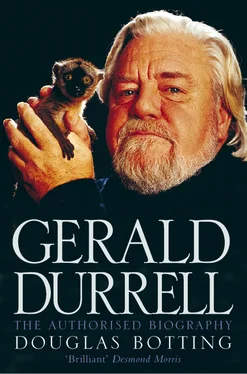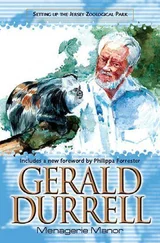The Red-eared Monkey is simply sweet. Its back is brindled green, its legs and arms lovely slate grey, white cheeks, red ear tufts and a red tail about two feet long. Bright red. It has the largest eyes I have ever seen in a monkey, light brown. It makes a delightful twittering noise like a bird. Its fingers are long and boney like an old man’s and it looks so sweet when you give it a handful of grasshoppers, it sits there cramming its mouth, twittering, and examining its fingers carefully to make sure it hasn’t missed any.
Before long the impact of Gerald’s collecting expedition on the impoverished economy of the locality had turned into something like an oil strike, relatively speaking. The inhabitants of the area would come in at all times of day and night from miles around, with a range of creatures so motley and diverse that any zoologist would have been seriously challenged to identify half of them. One of the joys of the business was that it was impossible to know what kind of animal would turn up next – large or small, rare or common, dangerous or docile.
At two o’clock one night, for example, Gerald was woken by a trembling watchnight (the local term for a night watchman) who informed him that a man was on his way with a large python. Gerald got out of bed expecting to see some backwoodsman with a snake about two feet long. ‘Instead of which,’ he recorded, ‘a crowd, as always, roared into the compound with hurricane lamps and in their midst were four carriers on whose shoulders was an enormous wicker basket about six foot long. They dumped the thing outside my tent and I found it contained a twelve foot python. Next came the jolly task of getting the bloody thing out of the basket and into the box.’ When it proved impossible to shake the snake out, Gerald tried to pull it out by the tail, and when that failed he grabbed it by the head and pulled. When this didn’t work either, he had no alternative but to cut the basket clean away and shake like mad. ‘He went into the box with an angry hiss and a bump, and I went into the tent and had a quick whiskey, as it had all been rather nerve-wracking. I am now Number One Juju Man in the village, because I touched the head and tail of the python and still remain alive.’
Most of the animals brought into camp were of the commoner varieties. To obtain the rarer species Gerald had to go out and find them himself. And so he entered the mysterious depths of the rainforest for the first time, and was bewildered and enchanted and for ever won over by the sights and the sounds and the scents of this almost holy wilderness.
‘The leafmould alone,’ he was to write of his first day in the forest,
contained hundreds of insects I had never seen or heard of before. Roll over any rotting log and I found a world as bizarre as anything dreamed up by science fiction. Each hollow tree was an apartment block containing anything from snakes to bats, from owls to flying mice. Every forest stream was an orchestra of frogs, a ballet of tiny fish, and from the canopy above came a constant rain of fruit, twigs and pirouetting blossoms thrown down by the great army of creatures – mammals, birds, reptiles and insects – that inhabit this high, sunlit, flower-scented realm. I did not know where to look next. Every leaf, flower, liana, every insect, fish, frog or bird was a lifetime’s study in itself, and I knew that there was another hidden, secretive army of creatures that would emerge at night to take over. As any naturalist knows, there is nothing like a rainforest for replacing arrogance with awe.
Gerald felt his own sense of life echoing back to him from the surrounding jungle. ‘In the Cameroons I was walking in a cathedral,’ he recalled, ‘staring endlessly upwards, only just able to glimpse the frescoes on the ceiling. That was rainforest for me. As a naturalist you have no idea, until you’ve experienced the tropical forest, how complex, astonishing and differentiated it is. When I first read Darwin’s outpourings in The Voyage of the Beagle I thought they were poetic licence – only to discover, in Africa, that he was grossly understating it.’
Hunting in this primordial world was an arduous and occasionally perilous task at which Gerald rapidly became highly expert. Not that he ever felt afraid during these forays. In pursuit of the most sought-after prizes, he clearly believed that the ends justified the means.
I have been doing something very illegal, hunting at night with lights. The lights are carbon-burning ones like the miners use. You wear them on your forehead and with the terrific beam they throw out you can see the animals’ eyes reflected, and it dazzles them so that you can get close enough to catch them. I have been going out every other night with seven hunters, combing the forest for a very rare Lemur called an angwantibo. If I can get one my stock with London Zoo will rocket to heaven. So far no luck.
The other night we went out and had the best night yet. We walked for miles without seeing a thing, and then we came to a river. This was not very wide, but fast running, and the bed was composed of slabs of grey sandstone. The water had worn away the stone into channels, so you got a sort of canal about three feet wide and two feet deep. The sides were choked with vegetation, mostly ferns. I had only two hunters with me. These two are really very funny. Elias is short and fat, with a face like an ex-boxer and a funny waddling walk. His taste runs to highly coloured sarongs with blue and orange flowers plastered all over them. The other is called Andrai, * and he is tall and willowy, with an extraordinary face and very long fingers. He has a wonderful swaying walk, uses his hands like a Greek, and wears sarongs of pale pastel shades. The other member of our Band of Hope was a boy whose job it was to carry all the nets and bags and was as near as makes no matter to being a half-wit.
We waded up miles of these channels, Elias first, me next, followed by Andrai and the half-wit, who made as much noise as a herd of frightened elephants. Elias said that we might see a crocodile, and had cut me a forked stick to deal with such an eventuality should it arise. I thought the possibility was very remote, so I dropped the stick when no one was looking, and no sooner had I done this than Elias came to a sudden standstill, and groped behind me, imploring me to hand him the stick. I replied that I had lost it, and he uttered a cry of pain, drew his machete and crept forward. I strained my eyes to see what it was he was trying to catch. Suddenly I saw it, something dark which glinted in the light, the same shape and size as a baby croc. Elias made a dive at it with his knife, but it wiggled through his legs and swam at great speed down the channel towards me. I made a grab, missed and fell into the water, yelling to Andrai that it was coming. Andrai leapt into the fray and was neatly tripped by the bagboy. I saw the thing swim out of the narrow channel into a broad one. Here, I thought, we had lost it for ever. However, the bagboy had got his half wit working and had noted the stone under which it had gone to ground.
We all rushed down there, making a tidal wave of water and foam, and clustered round the rock. Andrai insinuated a long arm into the hole and then withdrew it again with a shrill cry of anguish, his forefinger dripping blood.
‘This beef can bite man,’ explained Elias, with the proud air of having made a discovery.
Andrai was at last persuaded to put his hand back inside the hole after some argument and cries of ‘Go on!’ and ‘Cowardy-cowardy-custard!’ in the local dialect. He lay on his tummy in about six inches of water, his arm in the bowels of the earth, explaining to everyone how very brave he was to do this. There was a short silence, broken only by grunts from Andrai as he tried to reach the beef. Then he let out a yell of triumph and stood up holding the thing by the tail. When I saw it I nearly fainted, because instead of the baby croc I expected he was holding a Giant Water Shrew – one of the rarest animals in the whole of West Africa.
Читать дальше










